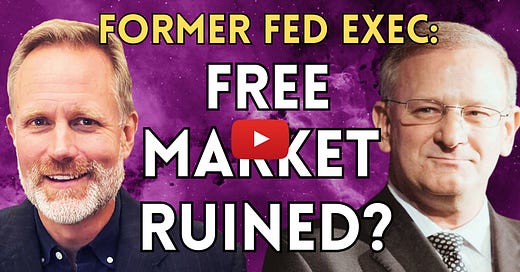The Fed Has Become Too Big | Thomas Hoenig, Former Fed Exec
And in doing so has ruined the free market
Well, we have a new US Presidential Administration with a very different economic strategy than its predecessor.
The president has already started vocally demanding the Federal Reserve be more aggressive in lowering interest rates.
And he's appointed a new head, Scott Bessent, at the US Treasury, replacing Janet Yellen.
What should we expect from the policies this Administration intends to pursue?
Will Jerome Powell march to the President's demands?
Or will he flex to assert the Fed's independence?
And where does inflation figure into all of this?
For a true expert's informed perspective on these very important questions, we have the great privilege today of speaking with Dr Thomas Hoenig, former CEO of the Kansas City Fed, former voting member of the Federal Open Market Committee, a former director of the FDIC, and now a Distinguished Senior Fellow at the Mercatus Center.
For a very important discussion of how central banking has ruined free markets, click here or on the video below:
IMPORTANT NOTE: tickets for our Spring online conference are now available at the Early Bird discounted price (our lowest!). So, if you haven’t yet, get your ticket now!
I’m so grateful to everyone who has kindly supported me by becoming a premium subscriber to this Substack. It’s making an important difference in helping me fund the substantial operating costs of running Thoughtful Money.
Premium supporters receive my “Adam’s Notes” summaries to the interviews I do, the wildly-popular MacroPass™ rotation of reports from esteemed experts, VIP discounts, plus periodic advance-viewing/exclusive content. My Adam’s Notes for this discussion with Dr Hoenig are available to them below.
If you, too, would like to become a premium subscriber to this Substack (it’s only $0.52/day), then sign up now below:
Adam’s Notes: Dr Thomas Hoenig (recorded 1.28.25)
EXECUTIVE SUMMARY:
The incoming U.S. presidential administration is taking a markedly different approach to economic policy, focusing on reducing government costs through spending freezes and layoffs. However, major spending reductions remain unlikely as entitlement programs, such as Social Security, Medicare, and Medicaid, make up nearly two-thirds of the budget and are politically untouchable. Additionally, defense spending is expected to remain high due to global instability. With national debt interest payments approaching $1 trillion annually, any meaningful deficit reduction will require deeper structural reforms.
The U.S. economy remains resilient as it exits 2024 and enters 2025, with strong consumer spending and continued growth in wages and investment, particularly in technology sectors. However, global economic conditions are less optimistic. Europe continues to struggle with weak growth, China faces deflationary pressures, and Canada and Mexico show slower economic momentum. The divergence between a strong U.S. economy and weaker international markets suggests potential risks if global economic challenges begin to impact U.S. trade and investment.
While financial markets appear stable, they remain vulnerable due to
Keep reading with a 7-day free trial
Subscribe to Adam Taggart's Thoughtful Money® to keep reading this post and get 7 days of free access to the full post archives.





